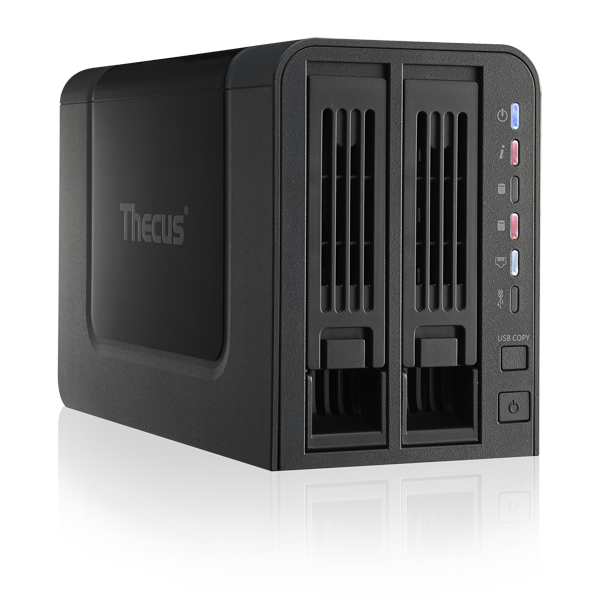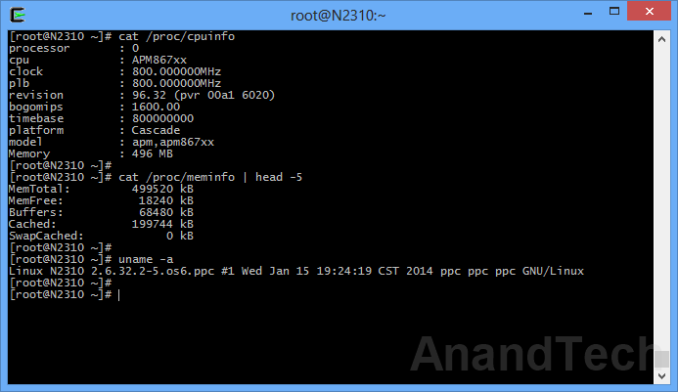Thecus N2310 Budget 2-bay NAS Review
by Ganesh T S on July 6, 2014 2:30 PM EST- Posted in
- NAS
- AppliedMicro
- Thecus

Introduction
The consumer NAS market segment is growing at a very fast rate, with 2 and 4-bay solutions leading the trend. While some vendors choose to compete on feature set (which tends to push up the price), others choose to approach from the cost perspective. Thecus has solutions from both perspectives. While the N2560 (review) was an Evansport NAS which presented a host of media-centric features, the N2310 that we are going to look at today cuts down the features (both hardware and software) to target entry-level users at a low price point.
The specifications of the N2310 are provided in the table below:
| Thecus N2310 Specifications | |
| Processor | Applied Micro APM 86491 (1C PowerPC 465 CPU @ 800 MHz) |
| RAM | 512 MB DDR3 RAM |
| Drive Bays | 2x 3.5"/2.5" SATA 6 Gbps HDD / SSD (Hot-swappable) |
| Network Links | 1x 1 GbE |
| External I/O Peripherals | 1x USB 3.0 / 1x USB 2.0 |
| Expansion Slots | None |
| VGA / Display Out | None |
| Full Specifications Link | Thecus N2310 Specifications |
| Price | $126 |
The N2310 runs a Linux kernel (v2.6.32). Other interesting aspects of the platform can be gathered after gaining SSH access into the unit.
In the rest of the review, we will cover the hardware aspects of the N2310 and provide some setup and usage impressions. This is followed by benchmarks in single and multi-client modes. For single client scenarios, we have both Windows and Linux benchmarks with CIFS and NFS shares. In the final section, power consumption numbers as well as RAID rebuild times will be covered along with some closing notes.
Testbed Setup and Testing Methodology
The Thecus N2310 is a 2-bay unit. Users can opt for either JBOD, RAID 0 or RAID 1 configurations. We benchmarked the unit in RAID 1 with two Western Digital WD4000FYYZ RE drives as the test disks. Our testbed configuration is outlined below.
| AnandTech NAS Testbed Configuration | |
| Motherboard | Asus Z9PE-D8 WS Dual LGA2011 SSI-EEB |
| CPU | 2 x Intel Xeon E5-2630L |
| Coolers | 2 x Dynatron R17 |
| Memory | G.Skill RipjawsZ F3-12800CL10Q2-64GBZL (8x8GB) CAS 10-10-10-30 |
| OS Drive | OCZ Technology Vertex 4 128GB |
| Secondary Drive | OCZ Technology Vertex 4 128GB |
| Tertiary Drive | OCZ Z-Drive R4 CM88 (1.6TB PCIe SSD) |
| Other Drives | 12 x OCZ Technology Vertex 4 64GB (Offline in the Host OS) |
| Network Cards | 6 x Intel ESA I-340 Quad-GbE Port Network Adapter |
| Chassis | SilverStoneTek Raven RV03 |
| PSU | SilverStoneTek Strider Plus Gold Evoluion 850W |
| OS | Windows Server 2008 R2 |
| Network Switch | Netgear ProSafe GSM7352S-200 |
Thank You!
We thank the following companies for helping us out with our NAS testbed:
- Thanks to Intel for the Xeon E5-2630L CPUs and the ESA I-340 quad port network adapters
- Thanks to Asus for the Z9PE-D8 WS dual LGA 2011 workstation motherboard
- Thanks to Dynatron for the R17 coolers
- Thanks to G.Skill for the RipjawsZ 64GB DDR3 DRAM kit
- Thanks to OCZ Technology for the two 128GB Vertex 4 SSDs, twelve 64GB Vertex 4 SSDs and the OCZ Z-Drive R4 CM88
- Thanks to SilverStone for the Raven RV03 chassis and the 850W Strider Gold Evolution PSU
- Thanks to Netgear for the ProSafe GSM7352S-200 L3 48-port Gigabit Switch with 10 GbE capabilities.
- Thanks to Western Digital for the two WD RE hard drives (WD4000FYYZ) to use in the NAS under test.











39 Comments
View All Comments
PEJUman - Monday, July 7, 2014 - link
Thanks! 'Convenience' exactly what I thought, just wanting to make sure I am not crazy/stupid :DI used to have an FTP server with public access on the router, but have since moved to Dropbox-Sky/OneDrive-Gdrive combo. Small files and slow upload speed drives me into these guys:
- Dropbox with truecrypt files for sesitive files (Dropbox supports segmented uploads, i.e. only changed portion of a large file is uploaded).
- Grandfathered skydrive for huge files.
- Gdrive for sharing with people.
For now these guys works very well for my cloud access needs... I use symlinks to change the windows default mapping to the above folders, and it's fire and forget to the whole family :D.
Phasenoise - Monday, July 7, 2014 - link
The answer is simple: opportunity cost. It's not a question of cash alone.Why don't I just mow my lawn? Why don't I just clean the house myself?
As an "Elder Geek" - I can make a lot of money in that time I'd spend setting up a file server. It's a solved problem with a commodity solution.
PEJUman - Monday, July 7, 2014 - link
I haven't personally looked at the recovery reliability on a failed drive on these things recently. but few years back it was quite a nightmare.Botched rebuild/recovery on one of these things could really wipe any opportunity cost you might have saved initially. Go ahead, ask me how I know.... :P
I make my money by geeking out on things that burn dead dinosaurs, when I geek out on electrons and silicons, it's meant as a hobby :D
Beany2013 - Tuesday, July 8, 2014 - link
Didn't see the further posts :-$I'm pretty sure the Syno RAID1 and RAID10-esque solutions are literally just EXT3/4 mdadm with some performance tweeks in the OS, so file recoverability in the event of a crash = Ubuntu bootable USB drive a machine with a few spare SATA slots:
http://www.synology.com/en-uk/support/faq/579
Others - not so sure. I'm not a fan of 'flex RAID' type affairs either.
wintermute000 - Tuesday, July 8, 2014 - link
I've had a series of QNAPs and they've all recovered a RAID-5 failure at least once, zero issues, just took ages to rebuild compared to a 'real' CPU in a 'real' server.Mind you QNAP / Synology is the gold standard for these home/SMB appliances. I wouldn't trust a Thecus myself.
jabber - Monday, July 7, 2014 - link
Maybe they just don't have the time? It's just storage. Storage is a commodity item. How amazing or convoluted to do you need to get to have a place to dump some data?kmmatney - Monday, July 7, 2014 - link
I also have a home-build whs server with 5 storage drives. It generally works fine, but can also annoying at times, especially with windows rebooting itself after updates, and lots of general Windows "issues" that have driven me nuts over the last few years. I would love to have something simple like this, but the expandability isn't there . You can't beat having 6-8 SATA ports on a motherboard, and then the ability to easily expand. I would really like to be able to buy something like an 8-bay NAS, and expand as I need it, but the price of that is ridiculous, so for now I'm just going the computer route (so I agree with you, but wish I didn't have to...).jabber - Monday, July 7, 2014 - link
You can have 8TB in a dual bay NAS, more soon. A couple of those isnt going to break the bank.Thats 16TB....
PEJUman - Monday, July 7, 2014 - link
if you have 8TB with Raid 0, it will break the bank when one of the 8TB fails.JBOD is better for single gigabit + home use.
tuxRoller - Monday, July 7, 2014 - link
What windows only features are you making use of that prevents you from changing the os?Assuming that it's mostly a file server the only thing that comes to mind is windows media center's ability to record arbitrary TV shows.